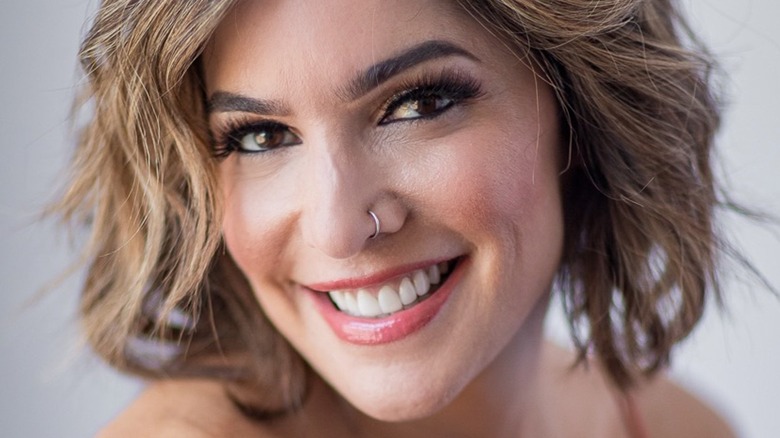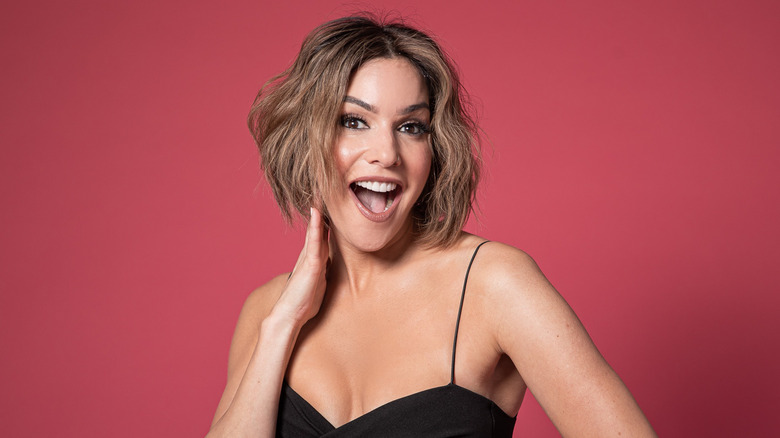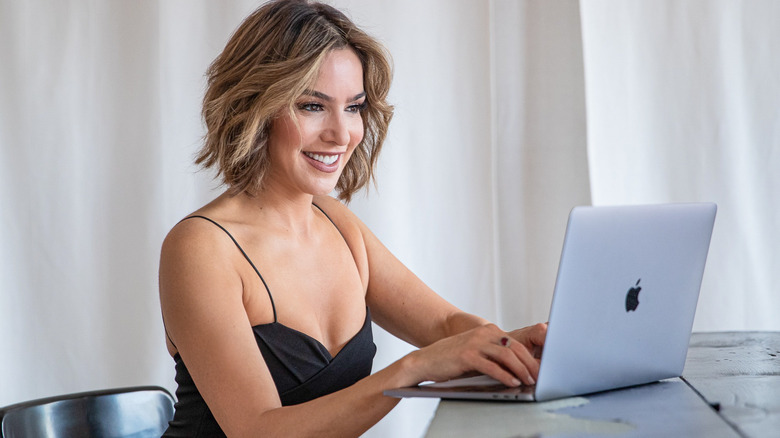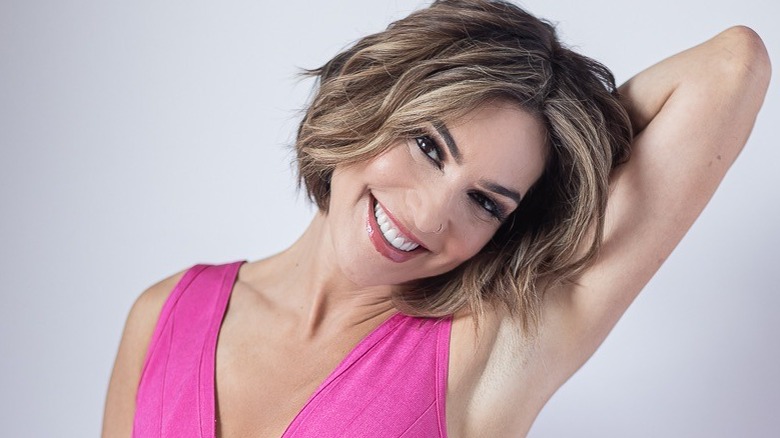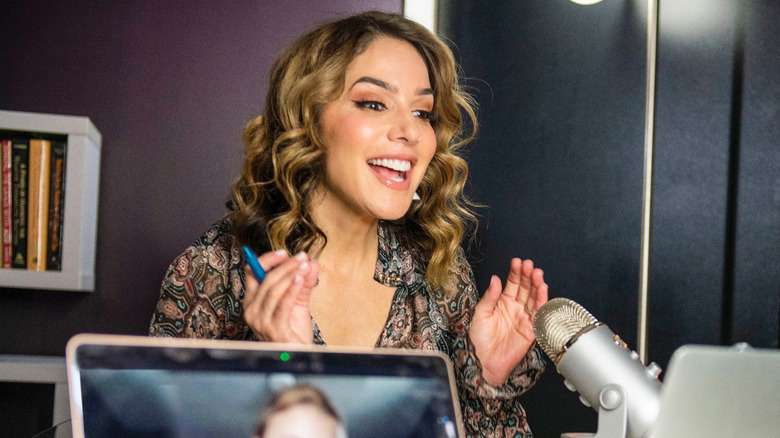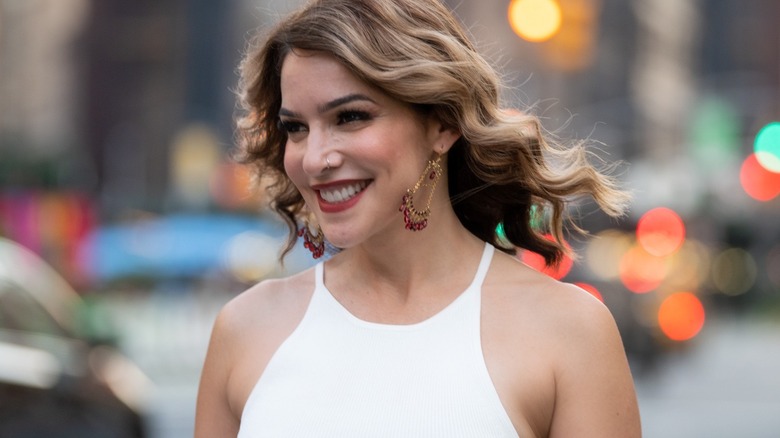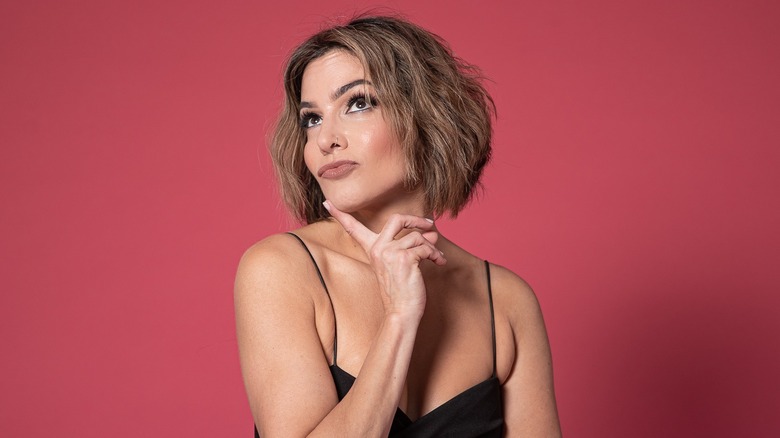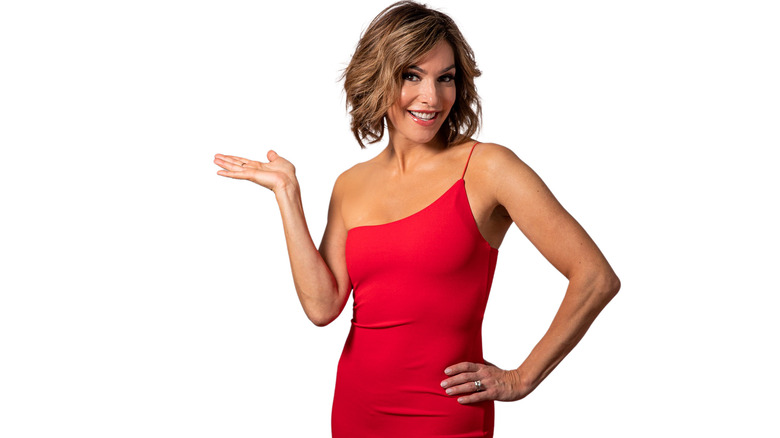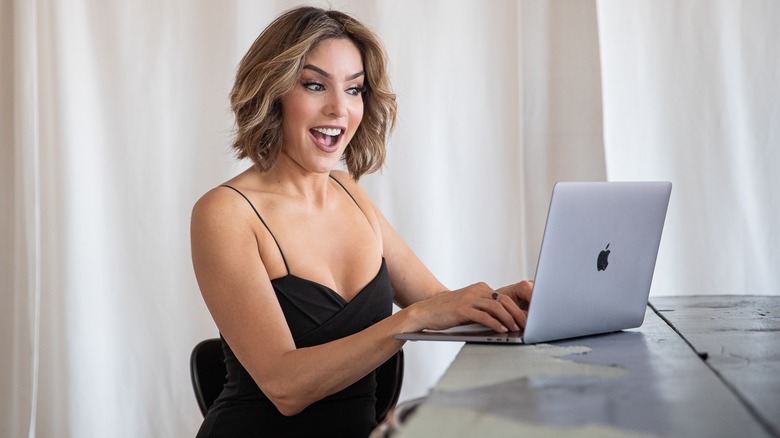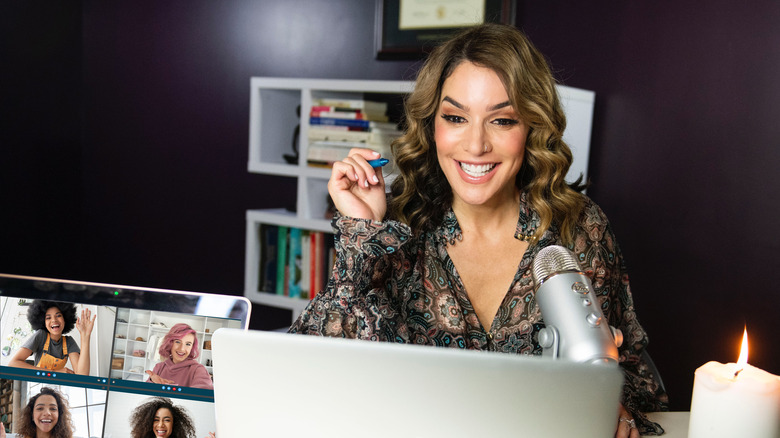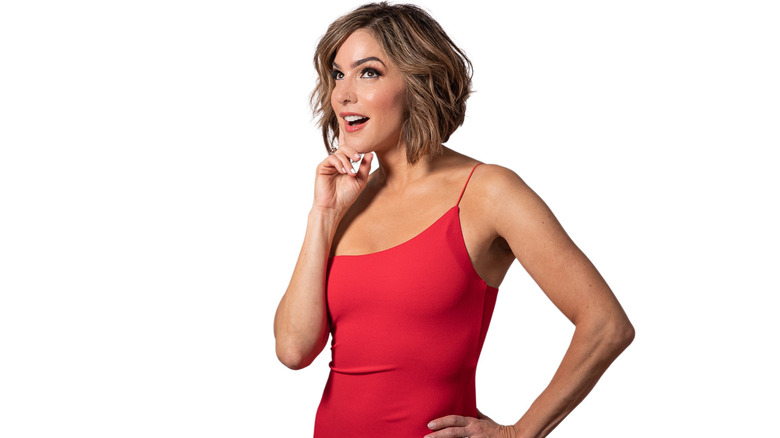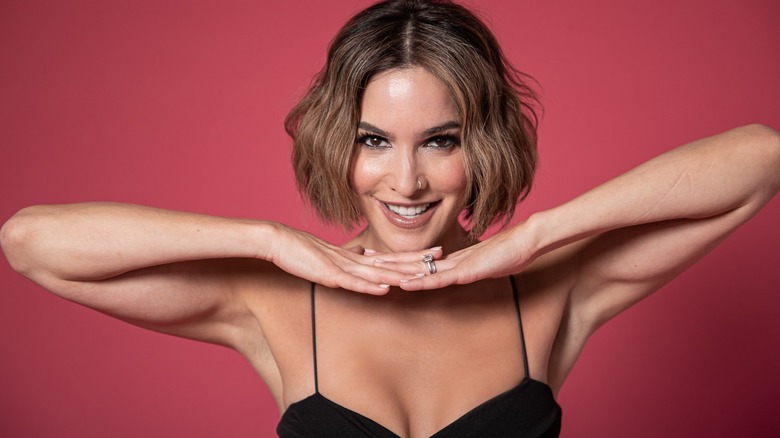Dr. Darcy Sterling Talks Famously Single And Jealousy In Relationships - Exclusive Interview
Sometimes a professional gets pulled into media because they're not only incredible in their field but also have a knack for television (and want to help as many people as possible). Such was the case for Dr. Darcy Sterling. Dr. Darcy is a licensed therapist based out of New York City who pushes the boundaries of what contemporary therapy can and should look like. Specializing in relationships, Dr. Darcy helps her clients maneuver love with her love, her wife Stephanie. The two run a practice in the city, but that hasn't stopped Dr. Darcy from reaching for even greater heights.
Dr. Darcy's expertise in relationships has led her to bigger opportunities, including being the global ambassador for Tinder and hosting E! Network's "Famously Single," a reality series centered on helping reality stars with their love lives. Throughout her career, she's wanted to help more people than she can feasibly reach in NYC alone, so she began creating online courses that anyone around the world can utilize. Her latest, her Jealousy Boot Camp, teaches couples how to maneuver their relationships when jealousy arises.
Dr. Darcy's relationship career started with an advice column
I'm really interested in what made you work with relationships and explore relationships for your career.
So, the first 15 years of my career, I worked with teenagers and my practice was called Alternatives Adolescent Counseling Center, now it's Alternatives Counseling Center. And the whole jam was really teaching relationship skills to teenagers and to their parents. So, in my practice, back in the day, we required that if parents wanted their kids to be seen by one of our counselors, they had to agree to parent coaching, which was code for, "You need to be in your own therapy and doing your own work." And we would separate out the parents; they would have a parent coach. The kids would see ... I did my best to avoid the parents because they were rough, man. They were rough. I looked very young in my 20s and 30s and the first question out of their mouths was, "Do you have kids?"
And I was like, "So, if, God forbid, someone in your family had cancer, would you be sourcing an oncologist who himself or herself had recovered from cancer? Or would you just be looking for the best qualified professional?" It took years to perfect that response because that would immediately shut them up. But they were really rough. And I love teenagers. I love how pliable they are, how hopeful they are, how open to change they are. So, I made sure that other people in my counseling center worked with the parents and I only worked with the kids. And at the end of the day ... that was my first 15 years of my career. And that was what I planned to do forever. Then I moved to New York, came out, and was writing a column for a lesbian magazine, local here to New York, called GO NYC.
And it was a relationship column. And then I started getting all these clients through that. And my brain is, I'm very left brain-oriented. I like to be organized and understand what is the common denominator among the people that I work with. And ultimately, I wouldn't say I set out to be a relationship therapist, but ultimately it was the same thing I was teaching the young adults in my practice, that I had been teaching the teenagers that my other clinicians had been teaching the parents. It was relationship skills.
So, what I honed in on — [to] make a long story not so short — was [it] doesn't matter what somebody comes to me for, what I wind up working with them on is teaching them to develop relationships skills, whether it's for their relationships at work or their family relationships, family of origin, or their family of choice or their friend groups or their intimate relationships. It's all the same stuff. The tools I'm meant to use with my wife are the same tools that I meant to use with my colleagues, with you, with everyone. And that's basically how I got there.
She believes the pandemic made humans realize how much we need each other
That's amazing. And that absolutely makes sense that those same tools like communication tools and all of that would be used for everybody.
Yeah, you need to know how to have a fight if you want to be a human being in the world, you know?
There's really no such thing as not having to interact with humans. And if there is, I've not seen that, that example of how one rolls through life that way. I imagine there might be. But for the vast majority of us, we are hardwired to be in relationships. Relationships are the most important ... not to be grandiose or anything, because I just fell into this. It wasn't my strategy to wind up being a relationship therapist, but truly at the end of the day, how we're going to determine the quality of our lives in our final analysis when we're sitting on our deathbed and hopefully we're all very old and it's a very peaceful process, we are going to reflect on our lives. And it's not going to be about how much money did I make or how successful was I? Was I famous? It's really going to be, I'm going to evaluate my life the same way you'll evaluate yours. How well did I love and was I loved? So, it's really, it's the essence of what we're here for, you know?
And there's never been a time with the people currently on the planet where we have had that clarified for us more than living through this pandemic because the very thing that got us through this was distance and it was the most painful thing for people. The distance was the most painful part of this. In any other crisis — any natural disaster, terrorism, any other crisis — people come together. We've had to stay apart to stay safe. It's been crazy, right?
Yeah. It's been heartbreaking.
Yeah, it has been heartbreaking. How many people passed away and their loved ones couldn't even be there with them?
Right, yeah. I can't even imagine.
Let's lighten it up. Yeah, that's real heavy. Lighten it up. [Laughs]
Dr. Darcy has specific advice for LGBTQ+ youth who are maneuvering relationships
You mentioned coming out. So, I wanted to skip ahead and ask you: for our young LGBTQ+ youth out there today who are trying to maneuver relationships and find themselves, what advice do you have for them?
I would give them the same advice that I would give the straight folks because I don't discriminate. It's so interesting. Like, I didn't intend to work with young adults and adults when I came to New York City and I certainly didn't intend to be the poster child for lesbians. And yet nonetheless, I always have — I want to say, half my practice is straight people. So, it doesn't even matter whether you're gay or straight, the same advice holds for everyone. We have to do our own work. It's not about finding the right partner; it's about becoming the partner that we want to be with because the partner we want to be with is going to look for a like-minded person. And they're not going to be attracted to us if our fractures aren't healing.
I don't think we ever are healed entirely, because we're imperfect beings. And I hope that people are ... I can only speak for myself, my intention is to be growing throughout my life. Yeah. God knows. I came out of childhood with enough fractures to take a lifetime of healing. But the people that we want are going to be people who are going to be looking for people like them. And if we can't find those people, it's because we have deeper work to do on ourselves. So the best thing that we can do to find the partner that we want is to do our own work because in relationships we wind up being a partner coach. We have to coach our partners. It's like, everyone can relate to this unless they're a virgin, and I'm assuming you're not. I'm not: full disclosure.
Most people don't want to be with a virgin. And the reason we don't want to be with a virgin is because we need guidance. We need the person to know what feels good. We need the person to be able to articulate what they like and what they don't like, to have some clue about themselves. And it's the same principle that holds for us outside of the bedroom. When we don't know ourselves, when we can't articulate our emotions ... because our partners, especially in the LGBTQ+ community, we tend to be more attuned to our partners than other people. And so, my partner's constantly asking, "How are you? Wait, where's your head at? What are you thinking? What were you just doing?" And if I can't articulate that .... they seem like very basic questions, but I can't tell you how many fights start just there with a blank expression and a defensive response or a response that doesn't really give them the information that they need to know what to do.
And so, we have to know ourselves well enough to guide our partners, to tell them what we like and what we don't like. So, and not just our partners, our colleagues, you know?
Yeah.
She began building online courses because of common relationship experiences
[On communicating with coworkers]
Just recently I was asking a colleague, is there something I've done that's caused you to change? Is there a way that I've been speaking that has caused you to shift? And I wanted that, I wanted that feedback because I knew that ... I had sensed a shift, and I wanted to create safety in the relationship. And I was open to the fact that maybe I wasn't so nice when a mistake was made. And if that was the case, I wanted to know so that I could change.
Yeah, absolutely.
But if that colleague didn't have relationship skills, she would've been like a deer in the headlights, or if she didn't even know what I was talking about ... The same relationship skills that we use anywhere are the same relationship skills that we use everywhere. And generally when our relationships flourish, they flourish across the board. Granted, a lot of people who are killing it in their careers don't invest enough time in their relationships. And it does depend. Look, killing it in your career? It's not magical. It takes a lot of hard work and dedication and time, and it's exhausting. And so, at certain points in our life, there's going to be less energy for our relationships. But when we have relationship skills, we can apply the same skills across the board in our life. And they will either rise or fall based on the level of competence that we have in those skills.
When it comes to your jealousy boot camp, where did this start? What does it entail?
So, part of the reason why I built a platform and subsequently built a media career, was because I knew that the stuff I do, one-on-one, boils down to skills and tools and training and education. And I knew that for sure, it's helpful when the person teaching them has a therapeutic background and can individualize them. I can individualize how I teach and the pace that I teach just for you, Preston. But truthfully, what I began to see was a rinse-and-repeat cycle of, I'm going through the same process basically with everybody. And what I wanted to do is reach more people than I can in an eight or a 10-hour day. So, I began building online courses to reach people that I otherwise wouldn't, people who find the whole therapy thing to be stigmatizing, or maybe they're just not emotionally ready for that level of commitment or that financial investment.
So, I started building relationship courses that are available, when they're launched online. They're not always available. Right now nothing's available. And in my first course with my wife ... So my wife is also a therapist, and we share a practice because we just can't spend enough time together. We thought we couldn't ... spend enough time together. And then we were in the pandemic and it turned out we [had] lots of alone time, even though we shared an office and a practice before. Nothing like lockdown in New York City to teach you just what togetherness can look like.
Jealousy is the 'third most common reason' couples seek counseling
[On her Boot Camp courses]
So, we built this first course called Relationship Skills Boot Camp. And the purpose of that course is to give people the fundamentals of everything they need to know to manage their relationships with much greater ease, much greater ease. And it begins to cultivate the deeper learning about yourself. So, it's for individuals, you can be a couple and going in, but you're each going separate, because it's a separate journey.
And so, I loved that course and I loved teaching it with my wife, Steph, because she and I don't really get to ... You know, we first met through work and through school and I never get to see her, and I rarely get to see her in that capacity, even though we share a practice. Because we're both behind closed doors all day long. So, we get to co-facilitate. We get to co-teach that course called Relationship Skills Boot Camp. For the next course, I knew I wanted to tackle an actual problem that people were cognizant that they had. And brainstorming with Steph, we came up with the idea of jealousy because it's the fourth most common reason for divorce and breakups, right behind infidelity, drugs and alcohol and money issues, then comes jealousy.
It's a third most common reason that people seek out couples counseling. And so, what we did was we started doing some research to see what else is out there because we didn't want to duplicate other people's courses. There's nothing out there for jealousy.
Oh.
The fourth most common reason for divorce and breakup and the third most common reason that people go into couple's therapy, and there's not a solution. There's one or two books —
Wow.
— literally written by actual professionals. The rest of the stuff. No shade on coaches, but frankly, very few coaches have actual training to do the stuff that they do, truthfully.
It's an unregulated profession. There are some certifications that you can get in the coaching space, but they're optional, they're not obligated. We are licensed professionals. I'm sorry, it is a distinction. And I feel it every month when I pay my student loans that are just now out of the six figures. Although combined, they're still back up in the six figures
She wants to treat an 'epidemic of jealousy'
[On creating her Jealousy Boot Camp]
So we knew we wanted to create something for this epidemic of jealousy. It is something that we see constantly in our practice. So, that was the impetus for building out the jealousy course. And as I began doing the research for it, because you have to do a lot of research if you're going to ... it's the way I've been trained with, that's how they try me in my PhD, like, "Must do academic research." It's been drilled into my head. And as I started doing the research, I realized why nobody's built a solution to jealousy.
The reason is, is because it's not an easy thing to solve. And the solve is easier to build on other people's research. If other people have done some basic research, it's easier to build a specialized course. I couldn't even get to specialized; I had to get to general. Although general in 2021, general in 2021. So, it's so the jealousy course that I built, I knew it had to have a component that focused on social media jealousy. Because even if you don't struggle with jealousy, and let me just clarify something, jealousy is a normal human emotion.
Yeah.
All people feel it. I don't want to pathologize a normal human emotion, but I do want to point out a distinction. My jealousy course does not try to cure a normal human emotion. For some people ... and most of us know this person, we know somebody in middle school or high school who just never grew out of it when lots of people were jealous and making scenes or agonizing all night long over where their boyfriend or girlfriend was or was what they were doing — that was a very common developmental thing in high school and middle school.
And as we become more whole ourselves, and I don't mean that in a condescending way, I mean as our self-esteem grows, as we get more comfortable in our own skin, as we begin to learn how to navigate the world and assert ourselves with confidence and self worth, and we're better able to tap into our truth, those behaviors are meant to go away. We're meant to grow out of them. For some people, they don't, and those jealous feelings and thoughts follow them from relationship to relationship.
How people experience jealousy differently
[On the different ways people show jealousy]
Now, my course, because I work mostly with women, probably a quarter of my clients are men, but most of my clients are female, I knew that the way jealousy manifests in women is different from the way it manifests in men. So, women are less likely, although I've certainly seen it and I want to say that I definitely have seen it firsthand, women are less likely to blow up, are less likely to physically go to locations, stalking somebody, are less likely to overtly try to control their partner the way men are more likely to.
And I want to say that I'm more hardwired like a guy, which is not to say that, I'm happy to report, I don't engage in those behaviors. Because I've never been a jealous person. I've had every other relationship problem there is. I've never had the problem of jealousy. I've just never been a jealous person, in any relationship. Sometimes a little platonically, I like to be everyone's No. 1 person, which is ridiculous, but in a monogamous relationship you are ostensibly the No. 1 person.
So I've never felt severe levels of jealousy, the way some people do. So, I was at a disadvantage because A, I haven't struggled with this issue, and B, if I had, it would've manifested more closely to the way it does in a man than it does in women. What I had to learn was that the way women respond to jealousy is sometimes they're dying on the inside and their partner doesn't even know. Because nobody likes that insecure girl. So, there's shame on top of jealousy. The kind of jealousy that my course addresses, I call obsessive jealousy. Because it's very similar to OCD-like symptoms. Women tend to be better disciplined because the way we socialize, boys and girls, is very different in the Western world, which is the only world I can speak to, and just marginally, by the way.
But truly, if you are a well-behaved woman, which I never was, you are more able, better able to control those urges and just die on the inside. I've never had that skill, by the way, the ability to be in pain on the inside and not let everyone around me understand the pain I'm in. I've always looked to others who are able to do that, the grin-and-bear-it stuff, and I've always wished I had like a drop or two, or maybe a cup or two of that inside of me, but I don't. But it makes it even more challenging because there's this other level of denial on top of it.
Because if you get good enough at managing your jealous impulses — that would be outward — if you're one of those people who wouldn't necessarily look at your partner's phone, and if you're somebody who has the self-control and the impulse control not to be interrogating your partner when they come in the door or when they're late or when you can't find them, when they're not responding to a text, it's very possible that your partner doesn't even know that you struggle with jealousy. So, now you're completely isolated and alone in this terrible state. And the way you tend to manage it is to go right to your own research. And what better way to research than by grabbing our phones, which [are] with us 24/7 and social media stalking. Which even non-jealous people have done, right?
Yeah, absolutely.
So, I knew that the course had to address social media jealousy. We've got a separate course and a bonus just for that. And that's how I wound up building out a series of courses to address jealousy. It's been quite a ride.
Dr. Darcy gets real about attachment styles
Let me ask you something. When you see those people, what do they look like to you? How do you know? How do you know when somebody struggles with jealousy? How do you know?
Oh, goodness. That's such a good question. How do I know? I just think there's always a sense of, I don't know, almost, like, insecurity, and you can tell that they, at least in my experience with people I know and grew up with and stuff, they don't often want to be by themselves. And when someone is not tending to them like they think they should be, they begin to panic. Yeah, I would say that's how I've noticed.
Preston, what you nailed just there is the cornerstone of my course. I had to draw from different theoretical perspectives to build out this jealousy course, not to put you to sleep with theory. But what you —
No, no.
What you just spoke to taps into what's called attachment theory. Attachment theory is a theory that goes like this, zero to five ... five-ish. Zero to five-ish. The way our primary caregivers interacted with us and showed us love will set us up for how we attach to people for the rest of our lives, unless we correct it. And it is correctable. What you just tapped into is, there's three different attachment styles. You can get lucky and come out of childhood with having a good enough parent and parenting experience, and you wind up with a secure attachment. I think that's 30% of us. Those are —
Not me. [Laughs]
Me. Well, no. Me now, but not out of childhood. I was broken, you know? So, the other two are the anxious attachment manifestation that you're describing, uncomfortable being alone needs to be in the comfort of another person. When I'm uncomfortable I look to ... if I have this, and I did, I straddled too. I was as fractured as they come. If I'm uncomfortable, I look to others to regulate and calm me and help me manage my emotions. I can't do it alone. And the reason that happens is because that comes from a certain type of childhood where the parenting was inconsistent and the way the kid learned how to get their needs met was by throwing a can f***ing ... Can I curse?
Yeah.
A little too late for that, right? By throwing a f***ing tantrum in the middle, and then their parent would respond. And what it taught them is the way you get your needs met is by demanding that they get met. If you are just quiet, they will not get met. And then there's another attachment style that's avoided. And those kids had an experience with their caregiver where the parents, they just weren't emotionally available. Either they were tending to another child that was sick, they had their own problems with their relationship, their work, poverty, lots of things.
But kids are amazing. We adapt our attachment style. We are hardwired to survive, and so people with an avoidant attachment style learn to shut their needs down. And so they're very, very comfortable in self-soothing and managing their emotions independently. And of course, it's generally an attachment, somebody with an anxious attachment style that's attracted to an avoidant attachment style, and the two are incompatible, but it's a great opportunity to heal together, you know what I'm saying?
Yeah, definitely.
So, yeah, you actually nailed one of the most fundamental theories that I draw from for that course.
Oh, wow. Yeah. I had no idea.
But becoming a trained writer. It's the same thing. No, it's 100% the same thing. You analyze, you look for patterns, you look for different variables and how different variables interact with one another. It's the same thing.
That's so interesting. I love the multidisciplinarity of things like that. Yeah, and also the same —
The intersectionality of ... Because hello, that's our world, right?
Dr. Darcy is 'naturally hardwired towards curiosity'
Yes, absolutely. You have your private practice in New York; you have been hosting "Famously Single" on E! Network; you have your Jealousy Boot Camp and your other online courses you've been making. And you were the global ambassador for Tinder. So, I just want to ask, how do you manage all of this together?
I mean, I don't sleep enough.
Fair.
I'm naturally hardwired towards curiosity and diverse activities because I have ADHD. So, I can go down a rabbit hole very easily. It makes it very easy for me to authentically connect with my clients. Doesn't matter what the h*** they do, I am fascinated about it. I want to learn everything there is to know about what it is they do ... And I didn't do it all at the same time. Everything happens in different moments. Building that jealousy course pulled me out of media for three years. Like, the only other thing I was able to do while I was doing that was my clients. And to be the global ambassador of Tinder. I could do hardly any media during that period of time. It was all-encompassing. And now I'm chomping at the bit. I'm like, okay, I've been in the course creation world for a few years, I am ready to go hit it again. And yeah, I just, I'm a social worker and social work is a very broad, diverse field. It allows me to do program development, which is the stuff I'm talking out with course creation and program development. It allows me to work one-on-one with clients. If I wanted to, which I don't, I could work with couples. My wife does that. Don't ask me why. I can barely handle one person at a time; she does two on one. Makes no sense to me whatsoever, but someone has to do it.
And there is, basically I could do home visits with my clients, anyway. So, social work, we're trained to use everything at our disposal to make services available to as many people as possible. And it's a very creative field. So, as many ways as we can imagine that showing up that way, that's within the parameters of my field, which I stepped in s***. I got really lucky with the degree that I picked. It it could have turned out very differently, but I, I happened to pick a career that allowed me the flexibility so that I could do many different things. And I don't do them all at the same time. I have to pick and choose. It's very hard because I do have ADHD and I want to do everything at once, but then I have this pesky need for sleep. So, what am I going to do?
I feel the same way.
But the other thing is I don't want to leave anything here when I'm done with my days. I'm also a dancer, a trained dancer, and our teachers, they tend to say, "Leave nothing in the studio. When you walk out of the studio, everything should be left on the dance floor. Don't hold anything back." What are you going to wait until you're in the shower? So, I'm not going to wait until I'm older to do the things I want to do. I'm too excitable and too curious, and don't have impulse control. And I found a way to make that work.
The Season 1 cast of Famously Single made Dr. Darcy 'bleed'
When it comes to "Famously Single," are there any moments that have surprised you?
Well, for sure. Just between you and me, right? I'm kidding. They made me bleed Season 1, and I don't mean production, I don't mean the network, I mean the cast. I was an unknown entity and they were going to make me prove that I had the chops to be in front of them.
Wow.
And let me tell you, it was a ride. Thank God I had the production company that I had, and I had the network I had. I'm so grateful to my network, E!, because they, at one point, empowered me. They were like, "If people aren't going to lean into the process, you are completely authorized to tell them to pack their bags."
That's amazing.
And at one point, I had to do that. I said, "We're either this or we're not, and if you don't want to be here, you can leave." Because, actually, I have never worked with a client who didn't voluntarily agree to work with me back. Even when I was working with teenagers, that was always my jam. I was that teenager who was forced to go to therapy and no one was making me talk. And I didn't want to sit there around [a] bunch of belligerent kids all day long who didn't want to talk to me.
So, I found a way very early on to empower them. And the way I did it was by saying, "Look, you may be mandated to therapy, but you're not mandated to see me as your therapist. And at the end of the session, you're going to decide whether you want to work with me or not. And if you don't, I will shake your hand and respect you. And I will tell your parents I'm not working with him or her. That'll be the end of it."
And from that point forward, again ... I got lucky that I was a tough kid, and I had those experiences that I could draw from to help inform how I was going to be as a therapist. So, by the time I got to "Famously Single," it was year 16 of my career, something like that, 17 of my career. I had never worked with a client who wasn't willing to work with me of their own volition. And straight-up, I said to them, "I have never worked with people who don't want to work with me. If you don't want to work with me, I'm not going to sell out for a television show. So, you can pack your bags." And from that point forward, everyone was in 100%. We had a great rest of the season.
They had such a good experience that I'm still in contact with everyone, and they all recommended their friends for Season 2. Season 2 came from their friendship groups.
That's really, really cool.
So, I have authentic real relationships with all of them. And I'm grateful for that. And we have definitely downloaded and talked about how rough they were on me Season 1. And it was fine because it made me stronger. Definitely, if I could go back in a time machine, I would prefer that it'd been maybe a little bit different, but at the end of the day, we came out very tight because of that experience. I have a bond with 16 people that no one else in the world has with me or with them. It's like summer camp. And it was an amazing experience, and I can't wait to do it again.
Dr. Darcy learned a lot from her Famously Single reality star clients
You've definitely helped them in really amazing ways.
Well, thank you. Thank you. The exchange was mutual. I learned so much from my clients, regardless of whether I see them individually, privately, or whether I meet them through media. I learn so much from the people I work with, and I'm as grateful for them, I suspect, as they are for me.
Yeah, definitely. I think it's interesting that the first time you ever encountered any kind of pushback was for a series.
Well, and I'm going to say, the power dynamic is different privately. I'm the one empowered. When you walk in as an unknown entity in a room full of celebs, there's an inverse in power. Until you are a known entity, you are disempowered. And so, I had to earn respect, and that was fair. They didn't become reality stars because they're easy to work with. And I don't mean that in the [sense of], "Oh, you're difficult." I mean they're very strong-willed people and I always wanted them to be strong-willed people. I just wanted them to have control over the dial of their strength so that they could dial it up or down at will.
Dr. Darcy's Jealousy Boot Camp Course is available now in its full length or a shorter course for beginners at jealousychallenge.com
